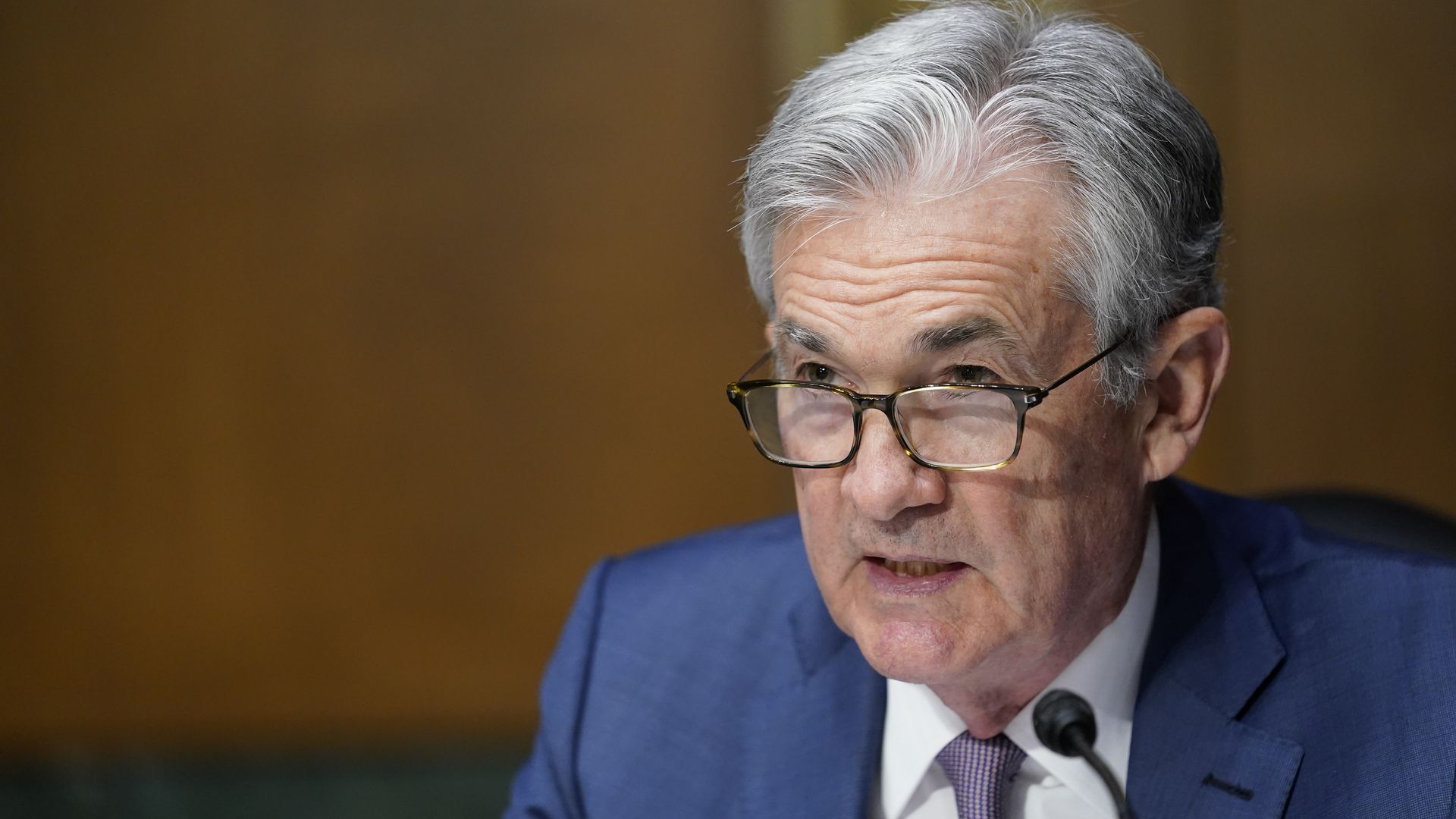| | | | | | | Presented By Northern Trust | | | | Axios Markets | | By Sam Ro ·Jul 29, 2021 | | Today's newsletter is 1,232 words, 4½ minutes. 💬 of the day: "We hear from businesses all over the country that it's very hard to hire, and that may be because people are shopping carefully for their next job." — Fed chair Jerome Powell | | | | | | 1 big thing: Meme stock icon joins Wall Street |  | | | Illustration: Sarah Grillo/Axios | | | | Today is the day everyone can begin buying and selling shares in Robinhood, which goes public on the New York Stock Exchange after raising $1.89 billion in its IPO, Axios' Dan Primack and Kia Kokalitcheva write. Why it matters: Robinhood is considered a proxy for the rise of retail investing, particularly among younger Americans. But it also has drawn regulatory and political scrutiny for a variety of business practices, and it's found itself in the crosshairs after users drove up the price of GameStop stock earlier this year. The bull case: Robinhood has become synonymous with mobile, no-fee trading of stocks, options and cryptocurrencies. Its business is booming. - Revenue soared more than 300% between the first quarter of 2020 and 2021, hitting $522 million. Annual revenue in 2020 was $959 million, up from just $277 million in 2019.
- Robinhood isn't just taking market share from traditional brokers, many of whom have aped its no-fee model, but it also is growing the market itself. The company claims that over 50% of its users are first-time investors and that its median customer age is just 31 years old.
- It's also benefitting from increased interest in cryptocurrencies, with Robinhood's crypto under custody growing from $414 million at the end of 2019 to $3.53 billion at the end of 2020.
The bear case: The risk factor section of Robinhood's IPO filing is a whopping 75 pages long. - Some of it is pretty standard for a fintech where asset and data security are paramount.
- But lots of it is very specific to Robinhood, which is the subject of class action lawsuits tied to this past winter's meme stock trading frenzy and regulatory lawsuits over alleged securities law violations.
- Regulators also are probing employee stock trades and the fact that Robinhood's co-founders aren't registered with FINRA, Wall Street's self-regulator.
- Robinhood's primary revenue source is from something called payment for order flow, and there's been some political and regulatory movement toward limiting or even abolishing the practice.
- Then there's the volatile world of crypto, with much of Robinhood's increase tied to the particularly speculative Dogecoin.
Keep reading |     | | | | | | 2. Catch up quick | | Facebook reported its fastest revenue growth in years, but warned growth would slow significantly. (Axios) Didi Global, the ride-hailing company facing a crackdown by the Chinese government after listing on the NYSE in June, is considering going private, according to a WSJ report. Didi denied it. (Bloomberg) Eurozone economic sentiment is at its highest level in at least 36 years. (Reuters) |     | | | | | | 3. All about the taper |  | | | Photo: Susan Walsh/Getty Images | | | | Federal Reserve chair Jerome Powell's Wednesday press conference focused on all things tapering, Axios' Kate Marino writes. Why it matters: With a rate liftoff not expected until the end of next year at the earliest, a tapering — or reduction — of the Fed's $120 billion per month asset purchases will be the first significant pullback of its emergency pandemic market support. - The last time the central bank pulled back on major asset purchases, in 2013, the surprise led to a Treasury sell-off — or "taper tantrum." The Fed wants to avoid that this time.
State of play: The Federal Open Market Committee's Wednesday statement says that the economy has made progress toward the committee's goals — a prerequisite for tapering and an acknowledgment that wasn't in its June statement. What they're saying: Powell said in the press conference that the committee discussed how it could adjust the pace and composition of the asset purchases — currently $80 billion in Treasuries and $40 billion in mortgage-backed securities. - Composition is a hot topic as surging home prices have led to questions over whether the Fed should still be propping up the MBS market. Critics' thinking is that the Fed should taper MBS sooner or faster than Treasury purchases.
- Powell knocked that down, saying there's "little support" for that idea.
What's next: The hunt for taper timing hints is on. The statement says the committee will continue to assess progress in coming meetings (plural) — leading many to surmise an announcement won't come at the FOMC's August Jackson Hole gathering, or its September meeting. The bottom line: Unless inflation rates jump high enough to worry the Fed, it's all about jobs growth over the next few months. And Powell is pretty optimistic about the state of the labor market. - "We're clearly on a path to a very strong labor market, with high participation, low unemployment and wages moving up," Powell said, adding that "it shouldn't take that long" to get there.
Go deeper: Powell isn't concerned by Delta surge |     | | | | | | A message from Northern Trust | | How investors can navigate a changing tax environment | | |  | | | | The prospect of higher tax rates has investors rightfully concerned about their bottom line. A new report from The Northern Trust Institute explores how to address unrealized gains in your portfolio and implement other tax-efficient investing strategies. Learn more. | | | | | | 4. Investors add to housing headaches 🏠 |  | | | Illustration: Annelise Capossela/Axios | | | | New data from Realtor.com, out this morning, shows that investor-driven purchases accounted for 5.7% of homes sold in April and are reducing inventory in 31 of the top 50 U.S. markets, Axios' Hope King writes. Why it matters: Individual homeowners have been struggling to buy homes over the past year amid short supply and rising prices. What they found: Analysts at Realtor.com looked at deed records for single-family homes, condos, townhouses and rowhomes from January 2000 to April 2021 nationally and across the 50 biggest metro areas. - They defined investors as any absentee owner who had an LLC, LP, LLP, GP or Trust in its name.
- The investor figure may be undercounted because the data doesn't capture small investors who don't register under a company name.
Areas with the most investor activity were the Phoenix/Scottsdale region in Arizona and the greater Atlanta area in Georgia. - Inventory levels declined 54% year-over-year as of April across the top 50 metro areas, to a median of 2.6 homes per 1,000 households.
What they're saying: Investors have deeper pockets and more flexibility than typical homebuyers, making them more "daunting competition," Realtor.com chief economist Danielle Hale said in a statement. What to watch: The next round of housing data. Demand continues to outpace supply, but inventory has started to improve and sales of new single-family homes have fallen. |     | | | | | | 5. Back-to-school spending bump 💰 |  | | | Illustration: Brendan Lynch/Axios | | | | Families are expecting to spend a record amount on back-to-school shopping this year, according to a new National Retail Federation survey conducted this month, Hope writes. Why it matters: Purchases will be driven in part by electronics items, putting more pressure on retailers and manufacturers to meet that demand amid a continuing chip shortage and other supply chain constraints. - Families with elementary school children are the most likely to say they are planning to purchase a smartphone this year, a shift from previous years when smartphone purchases skewed toward families with older children, according to the NRF.
By the numbers: Families with K-12 children expect to spend an average of $849 — up from $789 in 2020 and $697 in 2019. - College families say they anticipate spending $1,200 this year, up from $1,058 last year and $977 in 2019.
- Laptops are expected to be the top electronics purchase for both categories of families — with 49% of K-12 and 57% of college families saying they'll buy them.
What to watch: Ongoing chip supply issues are already hampering production and sales for companies like Apple, as we reported Wednesday. - About half of families still need to start back-to-school shopping, the NRF said on a call Wednesday. Given that and the upcoming holiday season, consumers should think about buying products sooner rather than later to get ahead of any inventory problems.
Of note: The survey of 7,704 consumers was conducted July 1–8 and has a margin of error of ±1.1 percentage points. |     | | | | | | A message from Northern Trust | | How to prepare your portfolio for tax reform | | |  | | | | Prepare your portfolio and wealth plan for change with research-based insights on the likelihood of proposed tax policy changes and cutting-edge wealth planning strategies for managing complex wealth from The Northern Trust Institute. Ready for reform? | | |  | | It'll help you deliver employee communications more effectively. | | | | | | Axios thanks our partners for supporting our newsletters. If you're interested in advertising, learn more here.
Sponsorship has no influence on editorial content. Axios, 3100 Clarendon Blvd, Suite 1300, Arlington VA 22201 | | | You received this email because you signed up for newsletters from Axios.
Change your preferences or unsubscribe here. | | | Was this email forwarded to you?
Sign up now to get Axios in your inbox. | | | | Follow Axios on social media:    | | | | | |









No comments:
Post a Comment